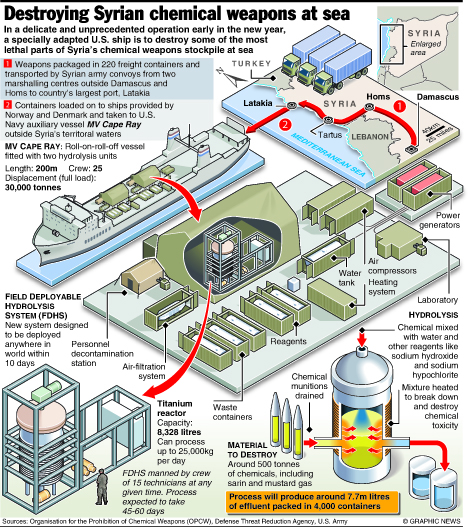Sunday Times 2
Multinational effort takes shape to remove Syria chemical arms
View(s):The Hague (AFP) – Russian armoured trucks will help take Syria’s chemical weapons out of the country, tracked by US satellite  equipment and Chinese surveillance cameras, in an unprecedented international operation, the world’s chemical watchdog said.
equipment and Chinese surveillance cameras, in an unprecedented international operation, the world’s chemical watchdog said.
The details are part of an ambitious plan unveiled by the Organisation for the Prohibition of Chemical Weapons (OPCW) at a meeting of its Executive Council published Wednesday despite delays to the overall operation which aims to be completed by mid-2014.
Several nations have already announced their offers of help, including the US, which is to destroy “hundreds of tonnes” of Category One chemicals — including mustard gas, sarin and VX nerve gas — aboard a specially-equipped ship in international waters.
A Danish and a Norwegian frigate are waiting in Cyprus to escort Nordic cargo ships to collect the chemicals from Syria’s main port Latakia, but the hazardous materials are still at 12 sites around Syria.
The Nordic vessels will take the chemicals to an Italian port, where they will be loaded onto the US ship for destruction, before returning to Latakia to pick up the remaining chemicals to be destroyed at commercial facilities outside of Syria.
The OPCW had set itself a December 31 deadline for the most dangerous chemicals to be taken out of Syria, via Latakia, but that date is likely to be pushed back.
Syria’s most dangerous chemicals must be destroyed by March 31.
“Schedules have been disrupted by a combination of security concerns, clearance procedures in international transit and even inclement weather conditions,” OPCW head Ahmet Uzumcu said in his speech made at an Executive Council meeting on Tuesday.
Fighting in the Qalamoun mountains on the road between Damascus and Homs “pose risks to the timely execution of the operation,” he warned.
Finland is providing chemical weapons emergency-response capabilities for the operation, Uzumcu said.
Russia will also provide sailors and naval vessels to secure cargo operations at Latakia and within Syrian territorial waters.
The US is also supplying 3,000 containers for transporting the over 1,000 tonnes of lethal chemicals and precursors, as well as loading, transportation and decontamination equipment, Uzumcu said.
Besides the surveillance cameras, required to monitor the transportation operation that is being carried out by the Syrian regime, China is also supplying 10 ambulances.
Uzumcu said that a trust fund set up for Syria’s ambitious disarmament programme currently has 9.8 million euros ($13.5 million), while Japan has pledged a further $15 million.
The hectic pace of the UN-backed bid to rid Syria of its entire chemical weapons stockpile by mid-2014 has slowed recently, but the meeting decided not to change any deadlines yet despite security and technical issues in the war-ravaged country.
Italian Foreign Minister Emma Bonino has said that OPCW officials will only brief Italian MPs on the “transloading” plan at an unnamed Italian port early in the New Year.
| Syria peace talks guest list
GENEVA (AFP) -UN-Arab League envoy Lakhdar Brahimi announced the list of delegations set to take part in next month’s long-awaited Syria peace conference in Switzerland. Wrangling continues over a potential role for Syria’s staunch ally Iran, and the make-up of the Syrian government and rebel delegations is still to be announced, but the remaining players have been settled, Brahimi said. The following is a list of the organisations and countries due to be involved: United Nations, with Secretary General Ban Ki-moon as conference chairman Permanent UN Security Council members Britain, China, France, Russia and the United States. Arab League head Nabil al-Arabi, European Union foreign policy chief Catherine Ashton, Organisation of Islamic Cooperation head Ekmeleddin Ihsanoglu, Algeria, Brazil, Canada, Denmark, Egypt, Germany, India, Indonesia, Iraq, Italy, Japan, Jordan, Kuwait, Lebanon, Morocco, Norway, Oman, Qatar, Saudi, Arabia, South Africa, Spain, Sweden, Switzerland, Turkey and the United Arab Emirates. |

